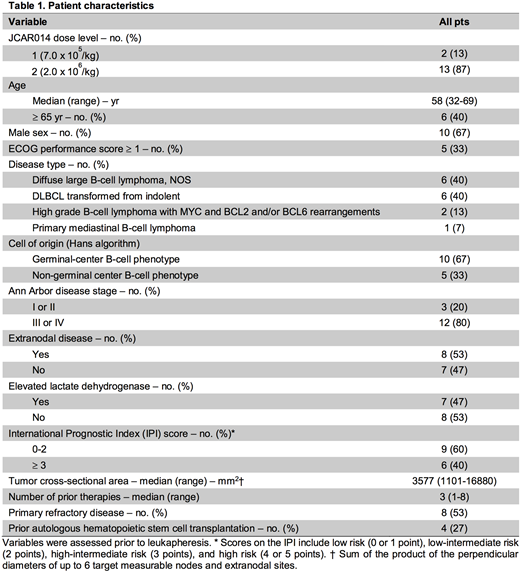Abstract
Introduction
Autologous T cells engineered to express a CD19-specific chimeric antigen receptor (CAR) have shown high overall response rates (ORR) in otherwise treatment-refractory CD19+ B-cell non-Hodgkin lymphoma (NHL); however, not all patients (pts) achieve complete remission (CR). PD-L1 expression on tumor cells and/or other tissues could impair the function of PD-1+ CAR-T cells and the efficacy of CD19 CAR-T cell immunotherapy. PD-1 pathway blockade may enhance the function and antitumor activity of CD19 CAR-T cells. Here we report preliminary data from a phase 1 dose-finding study (NCT02706405) of the safety and feasibility of combination therapy with JCAR014 CD19-specific 4-1BB-costimulated CAR-T cells and escalating doses of durvalumab, an anti-PD-L1 monoclonal antibody, in adults with relapsed/refractory aggressive B-cell NHL.
Methods
Pts are treated in one of two groups. All pts receive lymphodepletion chemotherapy with cyclophosphamide and fludarabine followed by infusion of JCAR014. Pts in group 1 receive the first infusion of durvalumab (225 mg, 750 mg, or 1500 mg) 21-28 days after treatment with JCAR014. Pts in group 2 receive the first dose of durvalumab (7.5 mg, 22.5 mg, 75 mg, 225 mg, 750 mg, or 1500 mg) 1 day prior to JCAR014 infusion. Up to 10 doses of durvalumab are administered after JCAR014 at the highest identified safe dose at 4-week intervals until toxicity or disease progression. We evaluated the safety, tolerability, and efficacy of the combination therapy and the pharmacokinetic profile of JCAR014 after infusion. Adverse events were graded using the Common Terminology Criteria for Adverse Events (CTCAE) v4.03, with the exception of cytokine release syndrome (CRS), which was graded according to consensus criteria (Lee, Blood 2014). Positron emission tomography/computed tomography was performed approximately 1, 2, 4, 6, 9, and 12 months after JCAR014 infusion and the best anti-tumor response was reported according to the Lugano criteria (Cheson, JCO 2014).
Results
Patient characteristics are shown in Table 1. Fifteen pts have been treated, including 6 in group 1 who received post-JCAR014 durvalumab doses of 225 mg (n = 3) and 750 mg (n = 3), and 9 in group 2 who received pre-JCAR014 durvalumab doses of 7.5 mg (n = 1), 22.5 mg (n = 1), 75 mg (n = 3), or 225 mg (n = 4). Durvalumab dose escalation is ongoing. JCAR014 manufacturing was successful for all pts. All pts received 2 x 106 JCAR014 CAR-T cells/kg, except the first 2 pts treated on the study who received 7 x 105 CAR-T cells/kg. Of the 13 pts who received JCAR014 at 2 x 106 CAR-T cells/kg, 5 pts (38%) developed CRS (2 grade 1, 2 grade 2, and 1 grade 4) and one (8%) developed grade 1 neurotoxicity. CRS and/or neurotoxicity occurred within 4 weeks of JCAR014 infusion, and were not observed when durvalumab was administered after JCAR014. With the exception of B cell aplasia, no autoimmune adverse events were observed.
Twelve of 13 pts who received 2 x 106 CAR-T cells/kg were evaluable for response. One patient, who had grade 4 CRS and biopsy evidence of extensive CAR-T cell infiltration into persistent sites of disease, elected to receive hospice care and died on day 32 after JCAR014 infusion without full response evaluation. The overall response rate was 50% (5 CR, 42%; 1 PR, 8%). Of the 5 pts who achieved CR, 3 were in CR at the first restaging after JCAR014 and 2 subsequently converted to CR after the first post-JCAR014 durvalumab infusion. Only one patient who achieved CR has relapsed (median follow-up 10.6 months, range 3.7-11.8). Continued stable disease or evidence of regression was seen in 4 of 6 (67%) initially non-responding pts who continued durvalumab therapy (median 5 doses, range 1-6).
CAR-T cell counts expanded in the peripheral blood within 14 days of JCAR014 infusion in all pts. Higher peak and day 28 CAR-T cell copy numbers in blood by qPCR were observed in responding pts. CAR-T cells were detected for a median of 5.1 months (range, 1.7 to 9.1 months) in responding pts. In vivo re-accumulation of CAR-T cells after the first post-JCAR014 durvalumab dose was observed in the blood of two patients in group 2.
Conclusion
The combination of JCAR014 with durvalumab for the treatment of adult pts with aggressive B-cell NHL appears safe; however, dose escalation is ongoing. Complete responses were observed both at initial restaging after JCAR014 infusion, and also subsequently in pts continuing durvalumab therapy after initially failing to achieve CR.
Hirayama:DAVA Oncology: Honoraria. Hay:DAVA Oncology: Honoraria. Till:Mustang Bio: Patents & Royalties, Research Funding. Kiem:Homology Medicine: Consultancy; Magenta: Consultancy; Rocket Pharmaceuticals: Consultancy. Shadman:Verastem: Consultancy; Beigene: Research Funding; Mustang Biopharma: Research Funding; Gilead Sciences: Research Funding; TG Therapeutics: Research Funding; AbbVie: Consultancy; Genentech: Research Funding; Pharmacyclics: Research Funding; Celgene: Research Funding; Qilu Puget Sound Biotherapeutics: Consultancy; Genentech: Consultancy; AstraZeneca: Consultancy; Acerta Pharma: Research Funding. Cassaday:Jazz Pharmaceuticals: Consultancy; Amgen: Consultancy, Research Funding; Merck: Research Funding; Seattle Genetics: Other: Spouse Employment, Research Funding; Pfizer: Consultancy, Research Funding; Adaptive Biotechnologies: Consultancy; Kite Pharma: Research Funding; Incyte: Research Funding. Acharya:Juno Therapeutics: Research Funding; Teva: Honoraria. Riddell:Cell Medica: Membership on an entity's Board of Directors or advisory committees; Juno Therapeutics: Equity Ownership, Patents & Royalties, Research Funding; Adaptive Biotechnologies: Consultancy; NOHLA: Consultancy. Maloney:Roche/Genentech: Honoraria; Juno Therapeutics: Research Funding; Janssen Scientific Affairs: Honoraria; GlaxoSmithKline: Research Funding; Seattle Genetics: Honoraria. Turtle:Precision Biosciences: Equity Ownership, Membership on an entity's Board of Directors or advisory committees; Adaptive Biotechnologies: Consultancy; Bluebird Bio: Consultancy; Gilead: Consultancy; Nektar Therapeutics: Consultancy, Research Funding; Eureka Therapeutics: Equity Ownership, Membership on an entity's Board of Directors or advisory committees; Juno Therapeutics / Celgene: Consultancy, Patents & Royalties, Research Funding; Caribou Biosciences: Consultancy; Aptevo: Consultancy.
Author notes
Asterisk with author names denotes non-ASH members.


